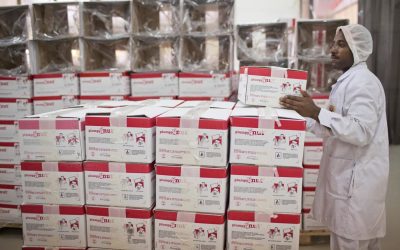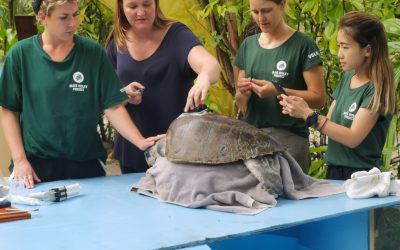
About
On Monday July 31st 2023, together with members of the Gathering for Open Science Hardware (GOSH) community, we hosted the first of two workshops to unpack how open hardware could support activities to mitigate the accidental entanglement of marine species (bycatch).
Arribada actively develops both monitoring (Insight360) and mitigation (Passive Acoustic Reflectors – PARs) solutions, licenced under GPLv3 and Cern v1.2, to help fishers and fishing associations monitor their catch at sea and to prevent the accidental bycatch of cetaceans by fitting PARs to static nets to make them more visible for echolocating cetaceans.
As Arribada’s goal is to develop open and accessible technology for wildlife, people and the planet, we wanted to reach out to the wider community of open hardware developers and practitioners via GOSH to better understand how we could create a fertile environment to help drive forward the continued development of open solutions, tools and designs.
A recording of the Making Waves webinar is available on YouTube or watchable below:
Discussion Points
Mentimeter, an online collaborative word cloud generator, was utilised to provide a way for webinar participants to share their thoughts on the following questions;
- What motivated you to join Making Waves today?
- What would you say are the main barriers to researching and developing bycatch mitigation solutions?
- What are the advantages and / or disadvantages to working openly?
- What actions could we take to make it easier for people to contribute to developing bycatch mitigation solutions?
- If an apprenticeship scheme was established, what should the scheme focus on?
Our objective was to first understand what the main barriers were to participating in the development of bycatch mitigation solutions – was there an appetite to support development activities, but no known pathway to getting involved?, i.e. did people want to help, but didn’t know where to start?, or were these other issues at play?
Ultimately, we wanted to better understand the full scope of barriers to advancing the adoption of open hardware to drive forward the development of open solutions for bycatch mitigation, so we decided to pose 5 key questions (below) targetting around specific discussion points, discussing for example if insufficient communication from those wanting to develop open solutions and those interested in getting involved was an issue, or if there was a lack of opportunities shared across open hardware community forums in general – is this where we should focus our attention?
Here’s what we discovered;
1) What motivated you to join Making Waves today?
We discovered that the number one motivation to join the webinar was to support conservation activities, closely followed by open science and open source development.
Knowledge sharing, technology and urgent action also scored highly, followed by learning, curiosity and solutions. It was clear from the results that there was a strong motivation to participate and a desire to support urgent conservation activities.

2) What would you say are the main barriers to researching and developing bycatch mitigation solutions?
By far the greatest barrier to researching and developing bycatch mitigation solutions was identified as funding limitations, be that access to funding, insufficient funding, or funding generally deemed as difficult to obtain, specifically for bycatch mitigation work that is a niche development space.
Policy was the second highest barrier. The main reason discussed was the communication of changes in policy, i.e. regulations and rules governing bycatch in different fisheries changing over time, that was challenging for open hardware developers to find, understand and act upon, with a suggestion that parsing policy into actionable hardware development would help to advance the development of solutions.
A key intervention in the policy space could be a concerted effort by NGOs and policy makers to share specific needs related to addressing policy regarding monitoring and mitigation hardware / tools that are desired based on performance, cost-point and accessibility, updated over time and covering fisheries and policy changes relevant to a specific country, fishery and those seeking support.
Interestingly, coordination also scored highly, addressing the suggestion that enhanced communication between policy advisors. fisheries associations and the open hardware development community could be impactful.

3) What are the advantages and / or disadvantages to working openly?
Popular advantages were noted as transparency, collaboration, knowledge sharing and avoiding duplication. Disadvantages included sustainable funding being hard to find (identified earlier as a key barrier) and no guarantee of adoption (take up), noted as an issue in comparison to commercially derived projects designed to generate sustainable funding and income – not to say that commercial projects cannot be open, but in reference to community developed solutions that may not be adopted for various reasons vs dedicated commerical entities developing solutions that may seem more attractive to stakeholders seeking to purchase or aquire bycatch mitigation solutions.

4) What actions could we take to make it easier for people to contribute to developing bycatch mitigation solutions?
When discussing actions that could be taken to make it easier for people to contribute, key responses matched with earlier indications that the main blockers were funding, accessibility, training, communication and capacity building.
Training also scored highly, with capacity building directly tied to training as an outcome. There was certainly a strong desire to support both from those participating in the webinar. Our next question (below) introduced a discussion to identify if apprenticeships were an option, and if funding and resources for those seeking an apprenticeship could be obtained to support the outcomes observed.

5) If an apprenticeship scheme was established, what should the scheme focus on?
Here, we wanted to understand if there was a specific area or skill (software / electrical engineering / mechanical etc) that an apprenticeship scheme could target, or perhaps focus on communications, project management and policy knowledge transfer – the role may not necessarily have to be technical. Helping to capacity build to break through certain barriers could be an answer if we could focus in on where to solicit training opportunities.
Responses to this question primarily stemmed around supporting technology development as a key focal area, touching on practical training, hands-on experience and science communication as other areas to explore, evenly scored throughout with no outlier. Hands-on experience is an interesting outcome, as this could be acted upon if hardware developers in the marine conservation sector were to support apprenticeship schemes and help to share first hand knowledge working in the sector. This is something that Arribada could directly support for example as both a facilitator of the webinar / workshop, but also an organisation directly involved in the development of open marine conservation solutions.

Recommendations & Next Steps
A full recording of the Making Waves: Open Hardware as a Solution to Scaling up Bycatch Mitigation webinar session is available to view on YouTube if you would like to listen back to the discussion (July 2023), and has been embedded below.
We learnt from the discussion that there was a strong will and desire to both participate in, and advance, the development of open source hardware – reflected in the response to our first question when we asked what the motivation was to participate, ultimately found to be a desire to support conservation activities, closely followed by advancing open science and open source development.
We also noted that knowledge sharing, technology development and urgent action motivated participants, followed by learning, curiosity and a desire to create solutions. We didn’t find that there was a lack of motivation, or any key barriers to motivating people to play a part in developing open hardware to scale up bycatch mitigation efforts.
When we asked what were the main barriers to researching and developing bycatch mitigation solutions? we discovered that funding remained the key barrier. This is a result that Arribada will share and circulate with policy advisers, Government stakeholders and NGOs seeking to fund or support bycatch mitigation activities via the Clean Catch UK programme in the United Kingom, and internationally via our partners. Our goal will be to highlight that there is a motivated and interested community, yet funding remains their key blocker, followed by policy knowledge exchange and coordination. Ultimately, if we can share policy needs more effectively with open hardware developers and supporters and couple this with funding opportunities, such as the WILDLABS Awards 2024: Supporting accessible, affordable, and effective innovation for nature, then we should be able to make progress in this space.
Finally, when we asked what actions could we take to make it easier for people to contribute to developing bycatch mitigation solutions? we found that both funding, training and capacity building were identified. Training and capacity building could be supported through an apprenticeship programme for professionals seeking to share their open source hardware development knowledge, or those working in policy, communications and project management able to capacity build and communicate the needs of Governments, fisheries assocations and NGOs more effectively to developers.
Thank you again to everyone who participated in the webinar. We look forwards to helping to advance the adoption of open solutions for bycatch monitoring and mitigation and hope to be able to share the outcome of actions taken based on the recommendations and outcomes of the discussion in the near future.
Continue exploring
GeoSeals trialled in Ethiopia
It was a warm afternoon in late May 2022, in a coffee shop in Portsmouth, when Ruby Hill and I first questioned “how...
New Horizons for rehabilitated sea turtles
The Olive Ridley Project and the Arribada Initiative are co-developing new low-cost telemetry tags to scale up the...
Three years in Antarctica – affordable and durable time-lapse monitoring
How it started The Arribada Initiative strives to make conservation technology open, affordable, and accessible to all...



0 Comments